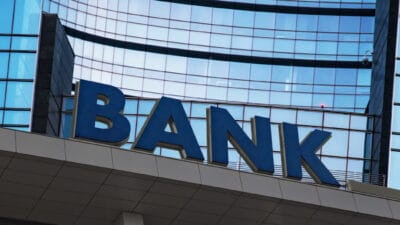S&P/ASX 200 Index (ASX: XJO) banks closed the day in the red on Thursday.
The big five bank stocks, which includes Macquarie Group Ltd (ASX: MQG), came under pressure following the latest interest rate hike from the US Federal Reserve.
Here's how these ASX 200 banks performed on Thursday, a day that saw the benchmark index slide 0.67%:
- Australia and New Zealand Banking Group Ltd (ASX: ANZ) shares closed down 0.39%
- National Australia Bank Ltd (ASX: NAB) shares closed 1.5% lower
- The Westpac Banking Corp (ASX: WBC) share price closed down 0.47%
- Commonwealth Bank of Australia (ASX: CBA) shares closed down 0.11%
- Macquarie shares closed down 1.78%
ASX 200 banks may also be facing some pressure after US Treasury Secretary Janet Yellen said the US government isn't discussing providing deposit insurance to every bank, potentially leaving smaller US banks in the lurch.
Yellen added that bank runs "may more readily happen now".
ASX 200 banks too big to fail?
As for ASX 200 banks, the nation's biggest banks enjoy an implicit guarantee from the Australian government (meaning us taxpayers) that they'll be bailed out if that need should arise.
This is separate from the Financial Claims Scheme, which guarantees deposits up to $250,000 per account holder at all authorised deposit-taking institutions (ADIs).
As The Australian Financial Review (AFR) reports, the bank levy on the big four banks and Macquarie raised almost $1.6 billion for the government in 2022.
A 0.06% tax is levied on the banks' funding sources. It came into being in 2017 as a way to have the ASX 200 banks chip in for the privilege of any bailout. It's an entitlement that comes with being 'too big to fail'.
Now, with the banking crisis gripping the United States and Europe, Australia's smaller banks think that levy should be reviewed.
Time to raises the levy?
Representatives of the smaller banks think the ASX 200 banks should possibly pay a higher levy. This comes as their own funding costs are on the rise in the current environment, making fair competition with their larger rivals more difficult.
According to CEO of the Customer Owned Banking Association Mike Lawrence (quoted by the AFR):
There are arguments to review [the levy] in the current environment. There is evidence to show they are not paying the full amount of the benefit they get from it. In the current environment, there is an argument to say it is too low.
Pointing to the fallout in bond markets from the UBS takeover of Credit Suisse, Lawrence added:
Funding costs will go up as a result of this, and potentially the differential between large bank funding costs and smaller lenders will widen.
Funding costs for smaller lenders relative to bigger ones are disproportionately impacted because having the implicit guarantee potentially puts them in a better position to raise funds at a lower cost. That should be reflected in the fee that they pay to the government.
Whether or not the ASX 200 banks will be hit with a higher levy remains to be seen.









